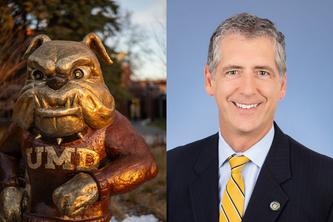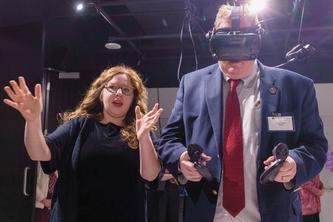
Today, University of Minnesota President Eric Kaler emphasized the University’s role in preparing students for Minnesota’s future careers and outlined the role the University’s 2018-2019 biennial budget request has in advancing that success.
The University’s legislative request promotes three key initiatives to benefit all five campuses in the U of M system: student success, translating research for the state’s common good and affordability for Minnesota’s students and families.
“We are grateful for our partnership with the Governor and the Legislature and look forward to continuing that this session,” said President Kaler. “By many measures, the University is on an upward trajectory with the quality of our students, the diversity of our research and the impact of our public engagement. Further investment and collaboration with the state will keep us on that path forward.”
In total, the University’s request includes $147.2 million in funding to support six priority projects:
- Core mission support: The U of M will retain faculty and staff, maintain key programs, ensure campuses’ safe and reliable infrastructure and minimize tuition costs for Minnesota resident students by addressing inflationary costs of critical research, education and outreach activities via state investment and internal adjustments. This request includes $22.6 million funding in fiscal year 2018 and an additional $23 million in fiscal year 2019 for a total biennial request of $68.2 million.
- Investing in student success: The U of M seeks to advance the long-term success of Minnesota’s students by improving retention and graduation rates and by making college more affordable throughout the U of M system. The initiative focuses on three critical pieces: Creating a new Student Success Center for undergraduate students across the University system, which will expand tutoring, writing, research, and career planning support; enhancing equity through pipeline programming like CORE 2025, an early outreach, high-touch cohort program with a goal to increase the number of academically prepared, college-ready, Minnesota students from historically underrepresented backgrounds; and expanding Science, Technology, Engineering and Math (STEM) education to meet student demand and workforce needs. The initiative includes $8.5 million funding in fiscal year 2018 and an additional $5 million in fiscal year 2019 for a total biennial request of $22 million.
- Expand MnDRIVE: The University proposes to build upon the success of the state’s 2013 MnDRIVE (Minnesota’s Discovery, Research and InnoVation Economy) investment and expand the partnership to include additional initiatives to solve Minnesota’s challenges in the areas of fighting cancer, strengthening communities, improving water quality and advancing data to drive the economy. The request includes $8.5 million funding in fiscal year 2018 and an additional $15 million in fiscal year 2019 for a total biennial request of $32 million.
- Advance NRRI applied research: With legislative funding, the University will strengthen the applied research activities at the Natural Resources Research Institute (NRRI), housed at the University of Minnesota Duluth campus. Funding will support research critical to the state: minerals, mining and water; energy and the environment; forest products and bioeconomy. Since its founding in 1983, the NRRI has received no increase in its base funding. The request includes $1 million funding in FY 2018 and an additional $2 million in FY 2019 for a total biennial request of $4 million.
The following two initiatives are related to prior legislative session activities:
- Restore health training and services: The University aims to restore funding for two initiatives formerly funded by UCare: Family Medicine and Community Health residencies, which train future family physicians for underserved communities and the Mobile Dental Clinic, which provides preventive and primary dental care statewide. The request includes $6 million funding in FY 2018 and an additional $2 million in FY 2019 for a total biennial request of $14 million.
- Support the Bell Museum’s expanded programming: In order to fulfill of mission of the state’s natural history museum, the University requests funding to support the expanded operations, programming and outreach of the Bell Museum. The request includes $2 million funding in FY 2018 and an additional $3 million in FY 2019 for a total biennial request of $7 million.
Related links:
- Find out more about the University’s legislative request on the Government Relations website.
- Watch a video of MnDRIVE research at the U of M.
- Categories:
- Campus Affairs





